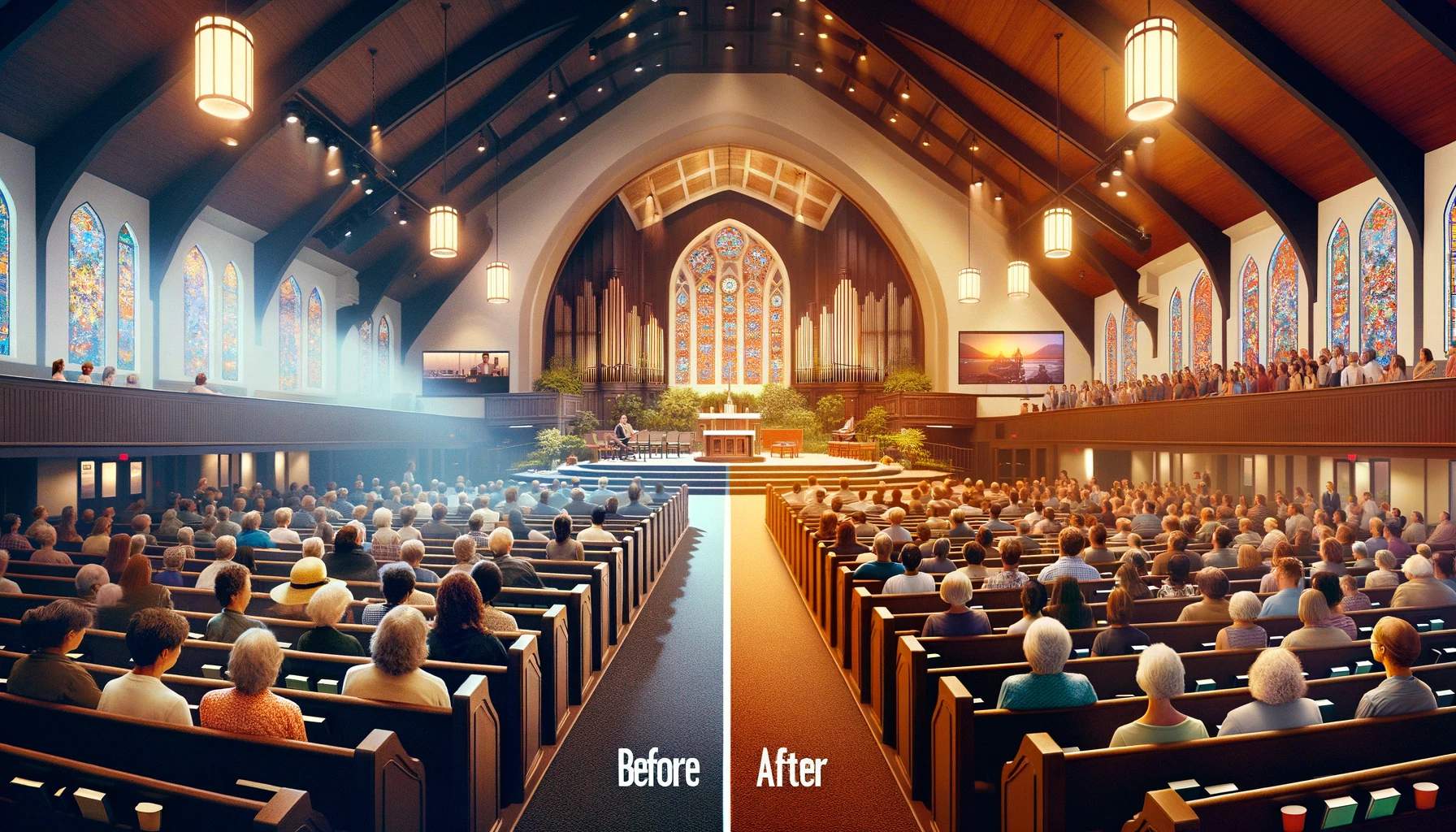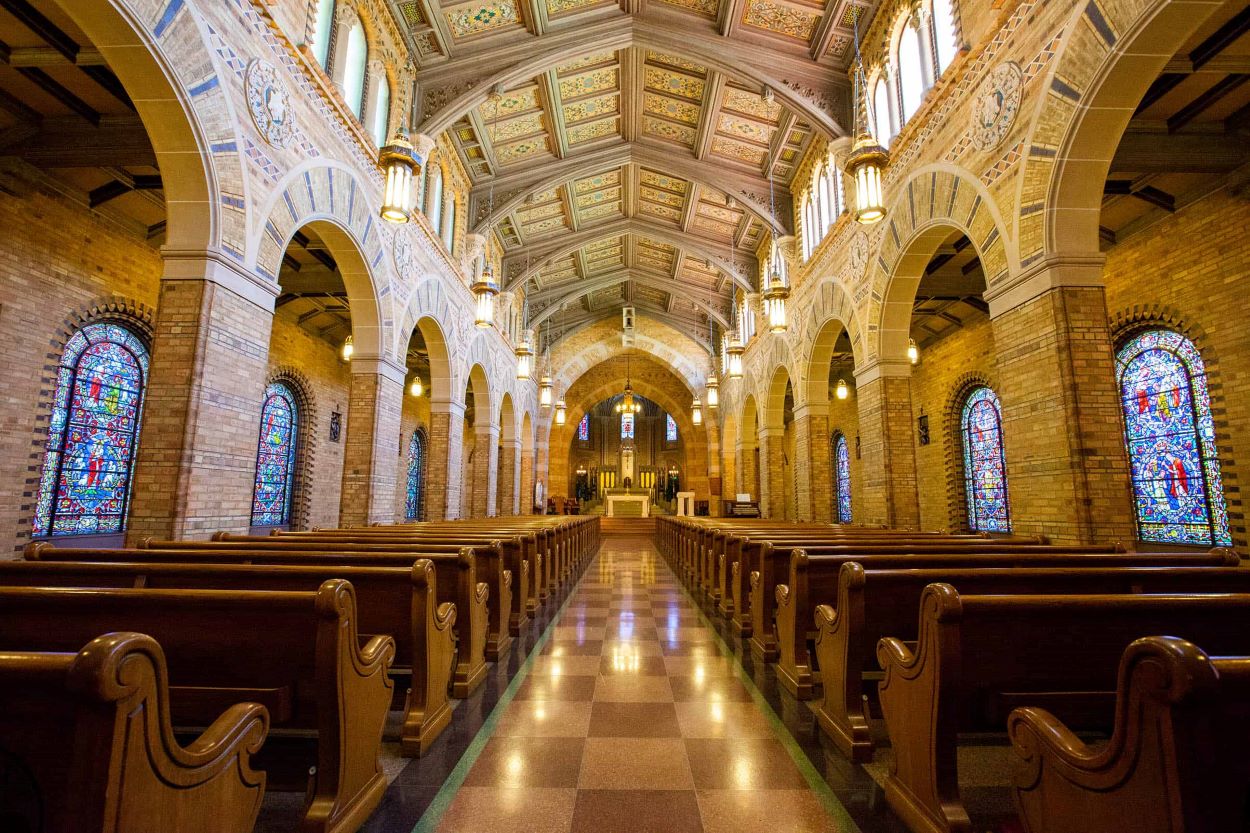Home>Theology and Spirituality>Why Are Baptist Churches Changing Their Names?


Theology and Spirituality
Why Are Baptist Churches Changing Their Names?
Published: February 22, 2024
Jason DeRose, Managing Editor at Christian.net, uses his expertise in religion and journalism to deepen understanding of faith's societal impacts. His editorial leadership, coupled with a strong academic background, enriches the platform’s diverse content, earning him recognition in both journalism and religious circles.
Discover the reasons behind the rebranding of Baptist churches and the impact on theology and spirituality. Explore the evolving trends in church nomenclature.
(Many of the links in this article redirect to a specific reviewed product. Your purchase of these products through affiliate links helps to generate commission for Christian.net, at no extra cost. Learn more)
Table of Contents
Introduction
The Baptist denomination has a rich history deeply rooted in the Protestant Reformation. With a commitment to the authority of the Bible, believer's baptism, and the autonomy of the local church, Baptist churches have played a significant role in shaping the religious landscape. However, in recent years, a noticeable trend has emerged within the Baptist community – a growing number of churches are changing their names.
This shift in nomenclature has sparked curiosity and raised questions about the underlying reasons and implications. It's a departure from tradition that has piqued the interest of both church members and outsiders alike. The decision to alter a church's name is not merely a superficial rebranding exercise; rather, it reflects deeper shifts within the congregation and the broader cultural context in which they exist.
As we delve into the historical background of Baptist churches and explore the reasons behind these name changes, it becomes evident that this phenomenon is not arbitrary. Rather, it is a response to evolving societal dynamics, theological considerations, and strategic outreach efforts. By examining specific examples of Baptist churches that have undergone this transformation, we can gain valuable insights into the impact of such changes on the churches themselves and the communities they serve.
The decision to change a church's name is a multifaceted one, influenced by a myriad of factors that intersect at the crossroads of tradition, relevance, and mission. It is within this complex tapestry that we seek to unravel the motivations and implications of Baptist churches embracing new identities. Through this exploration, we aim to gain a deeper understanding of the forces shaping the contemporary landscape of Baptist congregations and the enduring principles that underpin their faith and practice.
Read more: Why Did Houston Baptist Change Their Name
Historical Background of Baptist Churches
The roots of the Baptist tradition can be traced back to the 17th century, amidst the tumultuous religious and political landscape of England. Emerging as a dissenting movement within Protestantism, Baptists espoused distinctive theological convictions that set them apart from other Christian denominations of the time. Central to their beliefs was the concept of believer's baptism, which emphasized the voluntary and conscious decision of individuals to be baptized, in contrast to the prevailing practice of infant baptism.
The early Baptists were advocates of religious liberty and the separation of church and state, principles that were revolutionary in an era marked by religious persecution and state-mandated religion. Their commitment to individual conscience and the authority of the Scriptures propelled them to form autonomous congregations, free from external ecclesiastical control.
As Baptist beliefs took root and spread, the movement underwent diversification, giving rise to various Baptist groups with distinct theological emphases and organizational structures. From the Particular Baptists in England to the General Baptists in America, the Baptist tradition evolved and adapted to different cultural and theological contexts, embodying a spectrum of theological perspectives while maintaining core convictions such as soul liberty and the priesthood of all believers.
Throughout history, Baptist churches have been characterized by their commitment to missions, evangelism, and social engagement. Their emphasis on personal faith and the priesthood of all believers has empowered individuals to actively participate in the life and ministry of the church, contributing to a vibrant and decentralized ecclesial landscape.
The historical trajectory of Baptist churches has been marked by resilience in the face of persecution, theological diversity, and a steadfast commitment to foundational principles. This rich heritage has shaped the identity of Baptist congregations and continues to inform their ethos and practices in the contemporary era.
As we consider the historical backdrop of Baptist churches, it becomes evident that their journey has been one of adaptation, perseverance, and fidelity to core convictions. This legacy provides a compelling backdrop for understanding the dynamics at play as Baptist churches navigate the complexities of modernity and seek to express their enduring message in relevant and impactful ways.
Reasons for Name Changes
The decision to change the name of a Baptist church is often a reflection of the evolving dynamics within the congregation and the broader societal context. Several compelling reasons underpin this significant shift, each stemming from a desire to better align with the church's mission, engage with contemporary culture, and communicate its values effectively.
1. Relevance and Outreach
In an increasingly diverse and interconnected world, the name of a church serves as a crucial point of connection with the community it seeks to reach. A name that resonates with contemporary sensibilities and effectively communicates the church's identity can enhance its relevance and appeal. By adopting a name that reflects its mission and values in a culturally sensitive manner, a Baptist church can signal its openness and accessibility to individuals from diverse backgrounds.
2. Doctrinal Emphasis
The theological landscape within the Baptist tradition is marked by diversity, with churches often emphasizing specific doctrinal positions or theological perspectives. A name change may reflect a desire to underscore particular theological emphases or doctrinal commitments. For example, a church may choose to incorporate doctrinal descriptors in its new name to communicate its theological stance more explicitly, thereby fostering greater clarity and resonance with like-minded individuals.
3. Organizational Restructuring
Changes in the organizational structure or leadership of a Baptist church can prompt a reconsideration of its name. A church undergoing a merger with another congregation or experiencing a significant shift in its leadership may opt for a new name that reflects the transformed entity. This can signify a fresh beginning and a unified identity that encapsulates the shared vision and mission of the restructured church.
4. Cultural Context
The cultural milieu in which a Baptist church operates plays a pivotal role in shaping its identity and engagement with the community. A name change may be driven by a desire to navigate cultural sensitivities, language nuances, or historical associations that could impact the church's ability to connect meaningfully with its surroundings. By embracing a name that is culturally resonant and inclusive, a church can bridge potential barriers and foster a more authentic and impactful presence within its context.
5. Strategic Vision
The decision to change a church's name often aligns with a broader strategic vision aimed at revitalizing its impact and expanding its reach. This strategic rebranding may encompass a comprehensive reassessment of the church's mission, vision, and engagement strategies, with the new name serving as a catalyst for renewed energy and purposeful outreach.
In essence, the reasons for Baptist churches changing their names are multifaceted, reflecting a confluence of theological, cultural, and strategic considerations. These motivations underscore the dynamic nature of church identity and the ongoing quest to authentically express the timeless message of the gospel within the ever-evolving tapestry of human experience.
Impact of Name Changes
The decision to change the name of a Baptist church reverberates across multiple dimensions, exerting a tangible impact on the congregation, its relationship with the community, and the broader narrative of the church's identity. This transformative shift carries significant implications that resonate far beyond mere semantics, shaping the church's trajectory in profound ways.
Read more: Why Did Jesus Change The Apostles Names
1. Identity and Perception
A name change can redefine how a Baptist church is perceived both internally and externally. It serves as a symbolic marker of the church's evolving identity, signaling a departure from the familiar and embracing a new narrative. Internally, it can infuse the congregation with a sense of renewal and purpose, fostering a collective vision for the future. Externally, it communicates a message of adaptability and relevance, inviting the community to perceive the church through a fresh lens.
2. Community Engagement
The impact of a name change extends to the church's relationship with the community it serves. A new name has the potential to spark curiosity and draw attention, providing an opportunity for the church to reintroduce itself to the community. It can serve as a catalyst for renewed engagement, opening doors for meaningful conversations and collaborative initiatives. By aligning its name with the aspirations and needs of the community, a Baptist church can position itself as a relevant and approachable partner in the local context.
3. Mission and Vision
The name of a church is intricately linked to its mission and vision. A name change can signify a rearticulation of the church's purpose, encapsulating its renewed commitment to its core values and calling. It can inspire the congregation to embrace a fresh perspective on its mission, igniting a sense of shared purpose and unity. Moreover, it can galvanize the church to pursue its vision with renewed vigor, breathing new life into its endeavors and outreach initiatives.
4. Adaptability and Relevance
In an ever-changing cultural landscape, adaptability is paramount for the vitality of a church. A name change reflects a willingness to adapt to evolving societal dynamics and engage with contemporary sensibilities. It positions the church as a dynamic and relevant entity, capable of transcending traditional barriers and resonating with the diverse tapestry of modern society. This adaptability enhances the church's capacity to connect meaningfully with individuals from varied backgrounds, fostering a spirit of inclusivity and openness.
Read more: Why Was John The Baptist Named John
5. Legacy and Continuity
While a name change signifies a departure from the past, it also contributes to the ongoing narrative of the church's legacy. It represents a chapter in the church's journey, embodying the spirit of continuity amidst change. By embracing a new name, a Baptist church can honor its heritage while embracing the future, weaving a narrative that acknowledges the enduring principles of faith while embracing the evolving contours of its mission.
In essence, the impact of name changes on Baptist churches transcends the realm of semantics, permeating the fabric of the church's identity, its relationship with the community, and its aspirational trajectory. It embodies a narrative of renewal, adaptability, and purpose, shaping the church's story in ways that resonate with the timeless message it seeks to proclaim.
Examples of Baptist Churches Changing Their Names
The phenomenon of Baptist churches changing their names is not merely theoretical; it is a tangible reality unfolding across diverse geographical and cultural contexts. These examples offer a glimpse into the multifaceted nature of name changes within the Baptist community, shedding light on the motivations and outcomes of this transformative process.
1. First Baptist Church to Grace Community Church
In a bustling urban center, the First Baptist Church, established over a century ago, embarked on a journey of introspection and renewal. Recognizing the evolving demographics of its surrounding community, the church leadership discerned the need for a name that would resonate with a younger and more diverse population. After extensive deliberation and congregational input, the church transitioned to Grace Community Church. This name change reflected the church's commitment to embodying grace and fostering a sense of inclusivity, aligning with its vision to be a welcoming and transformative presence in the community.
2. Heritage Baptist Fellowship to Renewal Church
Amidst a suburban landscape characterized by rapid demographic shifts, the Heritage Baptist Fellowship underwent a strategic reevaluation of its identity and mission. As the congregation sought to engage with a burgeoning population of young families and professionals, the leadership recognized the need for a name that would convey a sense of vitality and renewal. Consequently, the church embraced a new identity as Renewal Church, symbolizing its dedication to fostering spiritual renewal and embracing a forward-looking vision. This name change catalyzed a renewed sense of purpose and energy within the congregation, positioning the church as a beacon of hope and transformation in its community.
3. Calvary Baptist Church to Hope Springs Community Church
Nestled in a rural setting, the Calvary Baptist Church grappled with the challenge of connecting with a broader cross-section of the local populace. As the church sought to embody a message of hope and restoration in a region marked by economic hardships, the decision was made to rebrand as Hope Springs Community Church. This name change encapsulated the church's aspiration to be a source of hope and renewal within the community, transcending traditional religious connotations and resonating with individuals from all walks of life. The transformation sparked a renewed sense of optimism and engagement, positioning the church as a catalyst for positive change in its rural milieu.
These examples illustrate the diverse motivations and outcomes associated with Baptist churches changing their names. Each instance reflects a deliberate and prayerful process, driven by a desire to authentically express the church's mission, engage with contemporary realities, and communicate its values effectively. The impact of these name changes extends beyond mere semantics, shaping the narrative of each church and its relationship with the communities it serves. It underscores the dynamic nature of church identity and the enduring quest to embody the timeless message of faith in ways that resonate with the ever-evolving tapestry of human experience.
Conclusion
The evolution of Baptist churches, exemplified by the trend of name changes, reflects a dynamic interplay of tradition, relevance, and mission. The historical backdrop of the Baptist tradition, characterized by theological diversity and a steadfast commitment to core principles, provides a compelling lens through which to understand the contemporary dynamics at play. The decision to change a church's name is not merely a superficial rebranding exercise; rather, it is a response to evolving societal dynamics, theological considerations, and strategic outreach efforts.
As Baptist churches navigate the complexities of modernity, the reasons for name changes encompass a spectrum of theological, cultural, and strategic motivations. From a desire to enhance relevance and outreach to a commitment to doctrinal emphasis and organizational restructuring, each impetus reflects a nuanced response to the evolving landscape in which these churches exist. The impact of name changes extends beyond mere semantics, shaping the narrative of each church and its relationship with the communities it serves. It underscores the dynamic nature of church identity and the enduring quest to embody the timeless message of faith in ways that resonate with the ever-evolving tapestry of human experience.
The examples of Baptist churches changing their names offer a glimpse into the multifaceted nature of this transformative process. Each instance reflects a deliberate and prayerful journey, driven by a desire to authentically express the church's mission, engage with contemporary realities, and communicate its values effectively. These examples illustrate the diverse motivations and outcomes associated with Baptist churches changing their names, highlighting the profound impact of this transformative shift on the churches themselves and the communities they serve.
In essence, the phenomenon of Baptist churches changing their names is a testament to the enduring vitality and adaptability of the Baptist tradition. It embodies a narrative of renewal, adaptability, and purpose, shaping the church's story in ways that resonate with the timeless message it seeks to proclaim. As Baptist churches continue to navigate the complexities of the modern era, the decision to embrace new identities reflects a commitment to embodying the enduring message of the gospel in relevant and impactful ways, ensuring that the timeless truths they espouse continue to resonate with the ever-changing tapestry of human experience.











